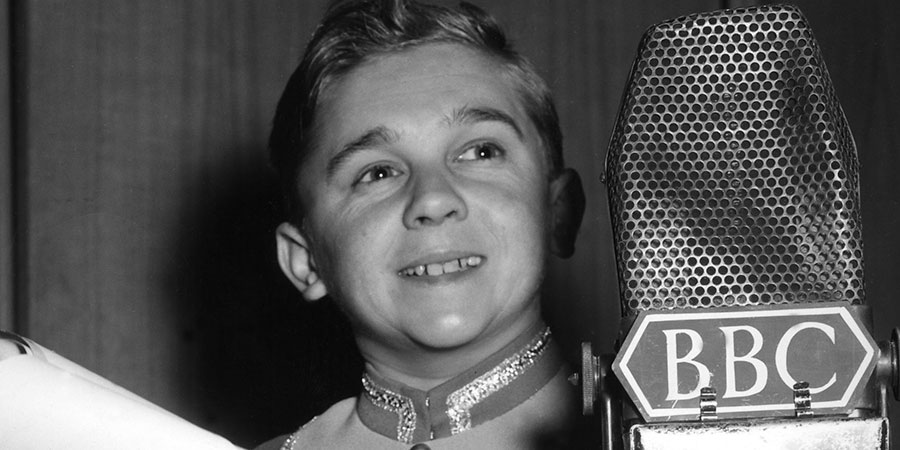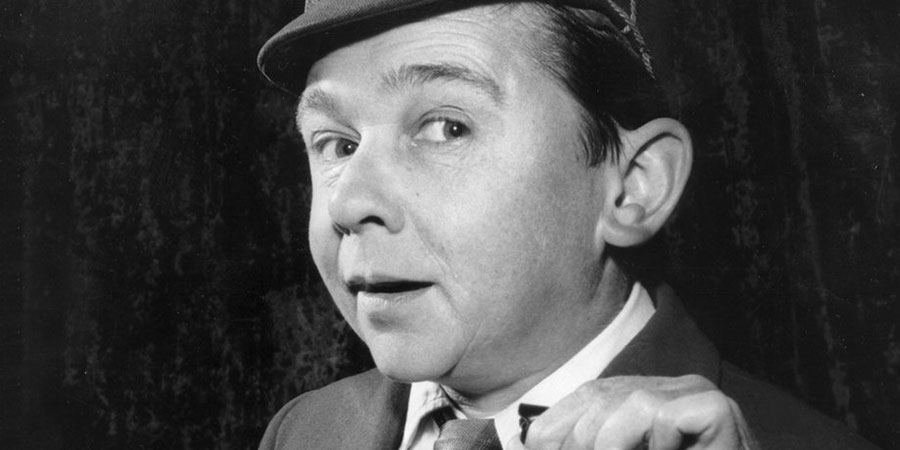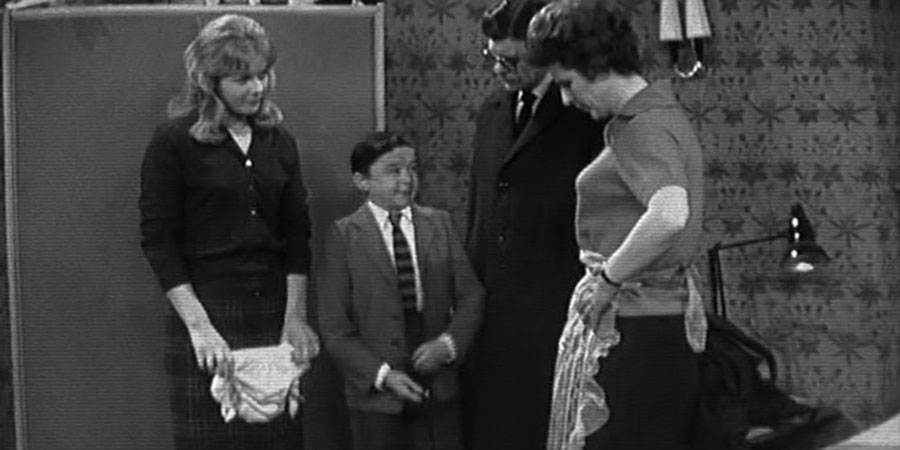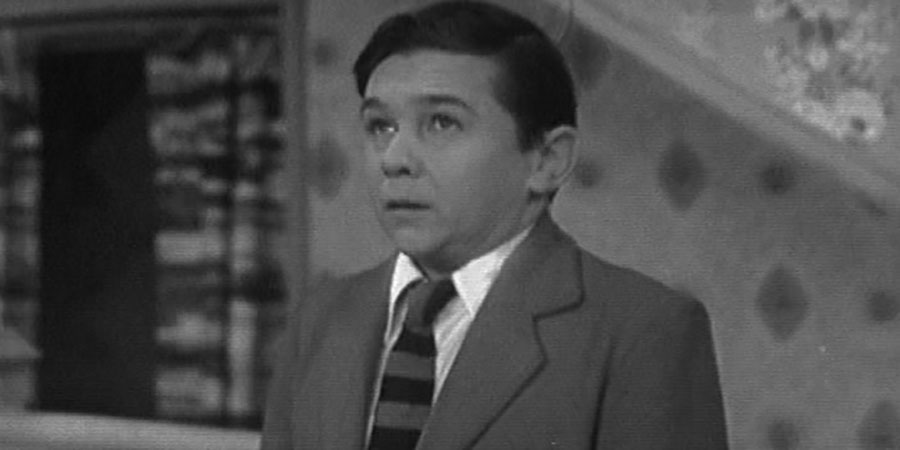
The TV trials of Jimmy Clitheroe

History teaches us that comedy can sometimes get lost in translation - and not just in terms of language, but also in terms of medium. For every Hancock's Half Hour, Goodness Gracious Me or Little Britain that makes a successful transition from radio to television, or a Dad's Army, Monty Python or Only Fools And Horses that graduates relatively effectively from television to stage, cinema and/or musicals, there are innumerable other shows that soared high in one medium only to fall down flat in another. One example of the latter is Jimmy Clitheroe's sitcom The Clitheroe Kid.
The Clitheroe Kid was a hugely popular radio show. Running for seventeen series and 290 episodes on the BBC from 1957 to 1972, it is still repeated today on Radio 4 Extra, and many episodes are freely available on YouTube. Starring Jimmy Clitheroe as the eponymous 'kid,' its novelty was that its star was actually a man who was playing, very effectively, a mischievous little boy.
It worked on radio. It worked on radio not so much because of the suspension of disbelief, but rather because of the blindness of belief. Jimmy Clitheroe sounded like a boy, so he seemed like a boy.
Due to his thyroid gland being damaged by forceps during his birth, the comedian (who did indeed hail from Clitheroe) had never grown beyond the height of four feet two inches, never went through puberty, and therefore had a voice that remained boyishly high-pitched through all of his life. He had overcome his adversity by making a career for himself in variety by playing roles normally intended for children - or, in the case of one of his collaborations with the famously eccentric Frank Randle, a ventriloquist's dummy.
He was, as a person as well as a performer, far easier to like and work with than his most famous predecessor as a professional 'small person,' Wee Georgie Wood (who was actually, by some seven inches, the taller of the two). For the stage, Wood had adopted a well-articulated Eton-collared choirboy image; Clitheroe went instead for a more demotic and playful look. Off the stage, Wood was an irascible, pompous and mean-minded man who hated his diminutive height and the kind of 'novelty' career it had constrained him within; Clitheroe, in stark contrast, was an even-tempered, modest and essentially decent person who appeared to be grateful for whatever good things that he gained.
They would meet on one notable occasion to record a 'passing of the baton'-style conversation for The Stage newspaper. Clitheroe, ever-respectful, addressed his elder as 'Mr Wood'; Wood, in turn, called Clitheroe 'Jimmy' and, as usual, was quick to take charge of the proceedings, patronising his fellow performer for merely 'perpetuating the "little boy" which was me'. According to the journalist who oversaw the meeting, much of what was said would never make it to print because, to the blushing Clitheroe's obvious discomfort, all that Wood seemed eager to talk about was 'his sex life in loud and leery tones and [he] kept asking Jimmy about getting his leg over'.
There was one exchange, however, that would prove rather pertinent for the future of the younger man's career. Wood asked him if he had any ambitions to one day make his mark in television. 'I'm not so sure,' Clitheroe replied cautiously. 'You've got to have it just right in so many ways, but I like it all right'.
Deep down, Clitheroe did indeed want to transfer his talents to television. His more immediate challenge, however, was to establish himself fully on radio.
This initial aim was aided greatly by his association with James Casey, the son of the great stage comedian Jimmy James. Casey was now a budding BBC producer, and he was looking for an act to champion for the wireless.
Having been impressed by Clitheroe's exuberant comic performances, which somehow managed to combine adult knowingness with child-like charm, Casey collaborated with the writer Frank Roscoe to create a sitcom that would showcase his talents. Starting out in 1955 as a sequence of seven minute sketches within a show called The Call Boy, it was rechristened The Clitheroe Kid in 1957 and (after BBC bosses' initial opposition to 'having a midget on the radio' was overcome due to the positive public reaction to past performances) it was given its own slot in the schedules.

Broadcast when many British families were sitting together digesting their Sunday lunch, The Clitheroe Kid proved to be an extraordinary success. It regularly attracted audiences of 8m or more, and its fifteen-year lifespan would make it the most-enduring BBC sitcom, on radio or TV, up to that point in its history.
It was a show that had a very broad appeal, with Jimmy (who remained stuck at around the age of eleven) interacting engagingly with his elderly Scottish grandfather, his (presumably widowed) Lancastrian mother, his older (strangely posh and southern-sounding) sister and, best of all, her boyfriend, the well-meaning but hopelessly gullible Alfie Hall (played by the brilliant, and today unjustly under-appreciated, Danny Ross). Supported further by Tony Melody as Jimmy's gruff-voiced and permanently irascible Mancunian neighbour Mr Higginbottom, and, in the years before his premature death, the versatile Leonard Williams as both the avuncular Liverpudlian tall-tale-teller Harry Whittle and the effete middle-class do-gooder Theodore Craythorpe, the sitcom was light, fast-moving, undemanding and, in the circumstances, quite believable. It also gave the BBC a welcome northern ingredient in what was otherwise a southern-heavy menu.
The sound-only sitcom, however, hid some inconvenient visions: such as the fact that Jimmy Clitheroe (who would never publicly admit to his real age) was only four years younger than Patricia Burke, who played his mother; and twenty years older than Diana Day, who played his elder sister; and ten years older than Danny Ross, who played his sister's youthful boyfriend. It was magic kept sheltered from daylight: while in real-life the star was a progressively prosperous middle-aged man who owned several properties, including a couple of bookmaker's shops and a hotel, as well as a racehorse, and drove a smart powder-blue Mercedes (customised with a booster seat and blocks on the pedals so that his feet could reach them), on the radio he was free to be the eternal child, the working-class Just William, whom his listeners had learned to love.
One might have thought that the sitcom would simply have been regarded as the summit of the comedian's unlikely achievements, a happy way of defying the sceptics and finding a way of endearing himself to the nation, but, to some, there was still more that could be exploited out of 'the kid'. Having made such an impact in one medium, there were some who were determined to make an even bigger one in another.
In 1963, the small commercial channel ABC (an ITV franchisee whose output was limited to the Midlands and northern England) decided to exploit the popularity of The Clitheroe Kid by adapting the format - without the BBC's formal permission - for television. Jimmy Clitheroe himself jumped at the chance of adding another project to his portfolio, especially as it promised a much bigger pay packet than he was getting on radio.
He had never lost the old variety performer's fear about future dips in fortune, and so money always mattered. This was a man who stayed in his own caravan rather than booked into a hotel when he toured the theatres, and was a master of claiming expenses for dining in restaurants while subsisting on meals made by his mother. Colleagues and business associates certainly all learned soon enough not to expect any acts of largesse from their parsimonious partner.
An old comedian friend called Tommy Trafford, for example, once negotiated a dramatic reduction in the price of a property Clitheroe was keen to purchase in Presall, near Blackpool, cutting it down from £17,000 to a bargain £10,000. 'You've done right well for me today,' exclaimed the delighted star. 'Don't you worry,' he added with a conspiratorial wink, 'I'll see you right!' What was Trafford's reward? 'He bought me a twenty packet of fags!'
It was more the promise of a pay rise, therefore, rather than the prospect of any artistic elevation, that lured Jimmy Clitheroe from sound to screen. The Kid was captured with cash.
It was an imprudent move by the performer. Failing to heed his own warning, as expressed a couple of years before to Wee Georgie Wood - 'You've got to have it just right in so many ways' - Clitheroe was content to leave much of the planning of the show to ABC, and, as a consequence, there would be more things that were just wrong rather than just right about his first TV starring vehicle.
Written by Bob Block (who would later have success with the children's series Rentaghost), the sitcom, called That's My Boy!, was no real departure from radio. It was a continuation of The Clitheroe Kid in all but name, with just a few superficial changes to keep the BBC, and its producer and writer, from contemplating any legal complaints.

That's My Boy! - which was set to go out just after four o'clock in the afternoons - teamed Clitheroe with Derek Guyler as his father, June Monkhouse as his mother and Vicky Harrington as his older sister, along with Gordon Rollings as the Danny Ross stand-in as the nice but dim friend of the family. The plots followed the pattern well-established by The Clitheroe Kid, with Jimmy variously obsessed with football games, pets, making extra pocket money or finding more food.
It was all far too familiar, but ABC - with baffling naivety - reasoned that this very lack of originality would attract millions of radio fans who wanted more of the same except now with pictures. The broadcaster, therefore, was very hopeful about the show's prospects.
The main problem with the programme, however, became immediately obvious as soon as it was visible on the screen. Jimmy Clitheroe, at the age of forty-two, was still playing a boy of about eleven, alongside a 'mother' who in reality was two years younger than him. He still sounded like a boy, but now, with the unforgiving close-ups of the cameras, he did not look like a boy - or at least certainly not the boy that the audience, who had spent years forming a mental picture to match the sounds that they heard on the wireless, had been expecting.
His face, by this stage, was starting to look lined and wrinkled, with his ears slightly elongated and drooping like Dali sundials, and his mouth curved and creased by decades of furtive cigarette smoking. His legs, exposed cruelly by the baggy shorts that he had to wear, were similarly distracting, resembling the knobbly knees bared by middle-aged fathers during Wakes Week rather than by schoolkids during the winter.
In terms of suspension of disbelief, this stark contradiction between sight and sound proved a step too far for many viewers. It also did not help that the production as a whole was so rushed and slapdash that most of the performances looked seriously under-rehearsed, and even, in certain scenes, audible prompts could be heard when the actors forgot their lines. The only thing that saved the show from criticism was the fact that the critics could not be bothered to review it.
The sitcom thus limped its way through its seven-episode run, seen only by a small audience, after which it was promptly cancelled. Jimmy Clitheroe, with a quick shrug of his shoulders, returned to his radio show, where his popularity continued to grow, and his experiment with television sitcoms appeared to have been consigned to the status of a brief and bad dream.
Incredibly, however, ABC had not given up on its belief that it could make the concept of a small middle-aged man playing a small boy seem viable in the visual medium. In 1964, therefore, it persuaded Clitheroe (once again more down to money than artistic ambition) to try again.
This time, he was assured, it would work. It would work, he was told, because of a number of new factors.
First, the focus would be more firmly on him than on a family - as the title of the new show, Just Jimmy, would underline. Second, this TV show would be even more like his radio show - and that ambition was backed up by ABC recruiting not only one of Clitheroe's old radio mentors, Ronnie Taylor, to produce it, but also his regular writer, Frank Roscoe, to script it. Third, the storylines would be (unofficially) adapted from ones that had been tried and tested on The Clitheroe Kid.
This shift to an even more shamelessly copycat strategy seemed to be based on the dubious belief, 'If it is broke, don't fix it - just break it a bit better this time.' It was, however, just what the insecure and conservative-minded star wanted to hear.
Clitheroe was further convinced that this production would succeed where the previous one had failed by Ronnie Taylor's decision to hire another old mutual friend, Mollie Sugden, to play his mother (Patricia Burke, sensing the displeasure of the BBC, had passed on the role), and his regular radio sidekick, Danny Ross, to reappear, again as 'Alfie,' this time as his cousin. Each episode would thus rely on this simple comic triangle, with Jimmy in the middle and his mother and cousin providing support on either side.
The problem with all of these changes, however, was that ABC had effectively handed over the production of its new TV show to a team whose previous productions had been for the radio. Ronnie Taylor and his colleagues were thus concentrating on improving the sound and substance of the show, while, quite unwittingly, they were neglecting to explore any ways to improve its look.

The casting of the new characters, for example, might well have represented a step forward in terms of improving the comic chemistry of the sitcom, but it was not destined to enhance its vision of verisimilitude. Mollie Sugden, after all, was actually a year younger than her 'son,' and Danny Ross, at thirty-three, was a little too old for the carefree and energetic character he was required to play.
There was at least more of an effort, this time around, to disguise the forty-three-year-old Clitheroe - his hair was dyed darker, he was covered in an extra-thick layer of make-up, and he would always be carefully-lit, and seen in long or medium shot whenever possible rather than risking an overly-revealing close-up - but the old problems of having an old 'kid' would continue to dog the production.
Then there were the script issues. Frank Roscoe, understandably, having worked with the star right from the start, felt that he knew exactly how to write for Jimmy Clitheroe's character, but, up until now, he had been writing for him on the radio, where 'Jimmy' could remain forever at the age of eleven, and keep on doing whatever any real eleven year old boy could do. Now, however, Roscoe was recycling the same material, in the same way, for someone who had neither the looks nor the energy of an eleven year old boy.
It also did not help that Ronnie Taylor, in his quest for the kind of intimacy that worked so well on radio, favoured a minimal set that forced the three characters close together whenever possible. This usually meant that Clitheroe had to perch on the end of a settee or slouch on a kitchen chair rather than run around like the hyper-active child that he was supposed to be. The star of the show thus looked as listless as he probably felt.
The sense that he was going glumly through the motions was made worse by the increasingly blatant reliance on the old but still very familiar Clitheroe Kid storylines, which revolved around such well-worn themes as keenly-anticipated football or cricket matches; keenly-anticipated boxing or wrestling contests; clashes with neighbours, over-demanding music teachers and headmasters; the intrusion of troublesome girls; the pursuit of improbable money-making schemes; or salivating over the prospect of squirrelling away more free sweets. Right from the start, Just Jimmy seemed painfully jaded.
Strangely enough, however, the sitcom would actually stagger on for no fewer than four years (consisting of five series and forty-nine episodes), and somehow managed to avoid the critical mauling that many other, similarly ill-conceived sitcoms, received. It seemed as though the critics, once again, had simply decided to pretend that it did not exist, and so it kept creeping out under the radar.
The critics were not the only ones who appeared to treat the show with a kind of benign indifference. Screened at Saturday teatime, against such stiff BBC competition as Doctor Who or Juke Box Jury, ITV seemed content to use it as a ritual sacrifice in the slot it deemed most likely to go unwatched. Its audience, as a consequence, shrank as swiftly as a salted snail, and, now witnessed by no one except a loyal cluster of die-hard fans and short-sighted newcomers, the Kid went out with a whimper.
For Clitheroe, this oddly long but largely unwatched goodbye was positively purgatorial. Unlike the short, sharp shock of his first sitcom failure, the slow zombie-like shuffle towards the cancellation of his second one at least provided him with a relatively private period of readjustment.
By the time, therefore, that the whole dispiriting experience was over, there was no desire left for any further attempt at mastering the visual medium. Jimmy Clitheroe was done with television, and television was done with him.
He withdrew from view and returned to radio, and his much-loved sitcom, and continued to enjoy great success for several more years. Combining his broadcasting work with far more lucrative summer seasons and pantomimes, he was earning as much as £50,000 per year (a considerable sum at the time), and, for a while, his post-television career seemed sound.
The ageing process, however, along with occasional bouts of ill-health, continued to take its toll on his appearance, and, with the strain of stage work now growing too great, the radio sitcom eventually became the sole focus of his professional life. When, therefore, it was eventually cancelled (much to his surprise) in 1972, he was left feeling bereft.
Having recently lost his first and only girlfriend, Sally, who had died in a car crash soon after they had argued over their future together, he was further rocked by the death at eighty-four of his formidable mother, Emma, with whom he had always lived, the year after the closing of his show. Coming in quick succession, these were three blows from which he never recovered.
He died, apparently from an accidental overdose of at least four sleeping tablets washed down with seven brandies, on 6 June 1973, on the day of his mother's funeral. He was only fifty-one.
He had lived just long enough to witness one final bitter-sweet irony: a new BBC sitcom made its debut on television, four months before his death, featuring a man who acted like a little boy. Its title - Some Mothers Do 'Ave 'Em - was, he was ruefully amused to note, inspired by a catchphrase from The Clitheroe Kid.
Help us publish more great content by becoming a BCG Supporter. You'll be backing our mission to champion, celebrate and promote British comedy in all its forms: past, present and future.
We understand times are tough, but if you believe in the power of laughter we'd be honoured to have you join us. Advertising doesn't cover our costs, so every single donation matters and is put to good use. Thank you.
Love comedy? Find out moreThat's My Boy! - The Complete Series

Diminutive variety star Jimmy Clitheroe was the perpetual schoolboy whose abundant Northern humour charmed and entertained a generation of British audiences. Employing his four-foot, three-inch stature and mischievous persona to brilliant comic effect, he proved phenomenally popular in every medium from theatre to film and records, with The Clitheroe Kid, one of Britain's longest-running radio sitcoms, drawing a peak audience of 10 million and spawning numerous catchphrases.
In 1963 Clitheroe's roguish creation hit television screens, causing further mischief for his fictional family in this ABC sitcom co-starring ITMA veteran (and future Please Sir! star) Deryck Guyler, and airing in the Midlands and northern England only.
Presenting all seven half-hour episodes of That's My Boy, along with the last remaining episode - Series 1, Episode 2 - of sequel series Just Jimmy (also starring Mollie Sugden), this set celebrates a uniquely talented yet now largely forgotten star, and introduces The Kid Himself to a new generation of classic comedy fans.
First released: Monday 19th May 2014
- Distributor: Network
- Region: 2
- Discs: 1
- Minutes: 207
- Catalogue: 7954106
![]() Buy and sell old and new items
Buy and sell old and new items
Search for this product on eBay
BCG may earn commission on sales generated through the links above.

